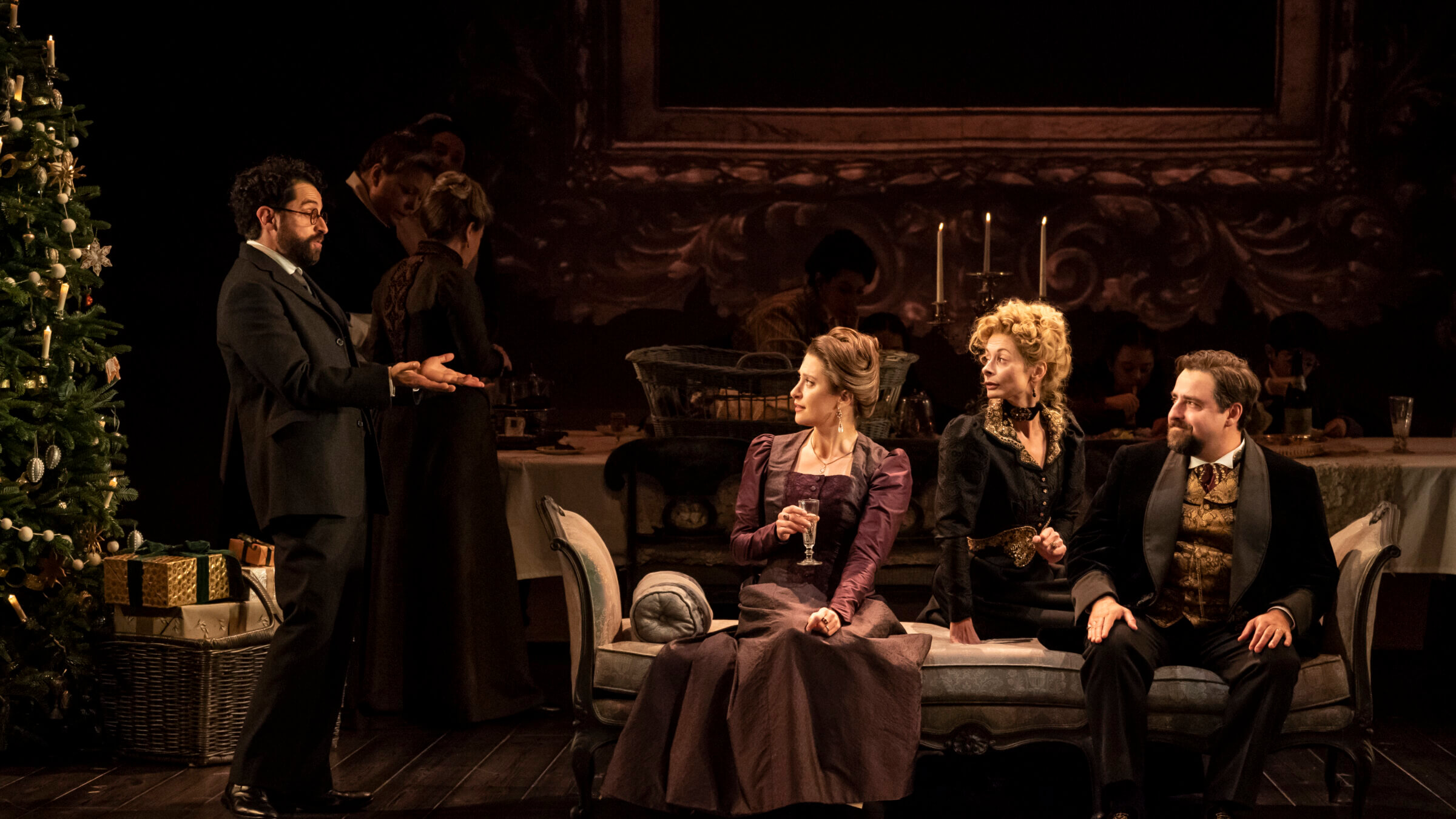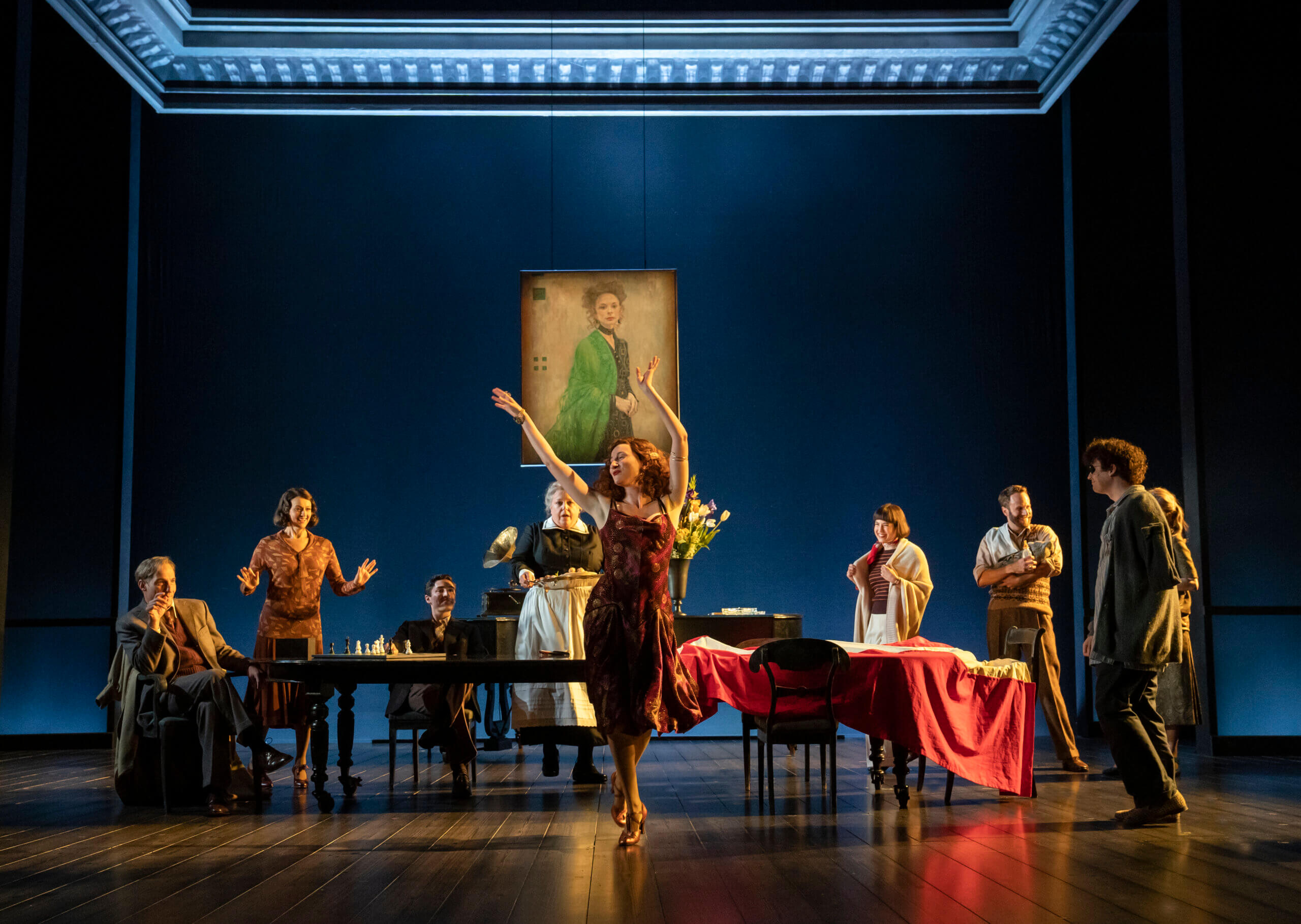In ‘Leopoldstadt,’ Tom Stoppard shows that there’s a difference between a Jew of culture and a cultural Jew
The playwright’s first reckoning with his Jewish past is too busy with history to engage in emotion

Brandon Uranowitz, Caissie Levey, Faye Castelow and David Krumholtz in “Leopoldstadt.” Photo by Joan Marcus
The first and strongest scene in Tom Stoppard’s “Leopoldstadt” is abuzz with activity — and ideas.
The play opens in 1899 in a wealthy, bourgeois apartment off the Ringstrasse in Vienna. There’s a Christmas tree bearing candles, soon to be claimed as interfaith by a Star of David topper. The adults are looking at books: Herzl’s “Judenstaat,” Freud’s “Interpretation of Dreams,” a racy play by Arthur Schnitzler (“La Ronde”). The Catholic wife of the master of the house mentions that she’ll be sitting for a Klimt portrait. There’s also a family photo album, a key prop that gets lost in the shuffle.
At some point, the many children — some baptized and with a Christian parent — scuttle off to see a nativity scene. In the lull, two brothers-in-law, the upwardly mobile and newly Christianized Hermann (David Krumholtz) and Ludwig (Brandon Uranowitz), a mathematician denied professorship by antisemitic quotas, discuss the Jewish question.
Hermann, having come of age during the emancipation of Austria’s Jews, believes assimilation will win out in the new century.
“We worship culture!” Hermann insists, listing the luminaries of the empire from Haydn to Brahms, and dismissing the bygone pogroms and expulsions that will, in the course of two hours and four generations, return to afflict the family.
Ludwig is less sanguine. “A Jew can be a great composer. He can be the toast of the town. But he can’t not be a Jew,” he says. “In the end if it doesn’t catch up on him, it will catch up on his children.”
This ineradicable Jewishness seems to have finally caught up with Stoppard, who, almost from short pants to middle-age, lived a life largely unaffected by his Jewish background.
Of course there is a paradox: This most Anglophilic of writers only wound up in England by dint of his Jewishness. He arrived there from India (by way of Singapore), having fled the Nazi invasion with his family when he was around 18 months old. Stoppard now may call himself an “English playwright of Jewish heritage,” but might I hazard another description?
Stoppard is a Jew of Culture — not a cultural Jew raised with Yiddishkeit, but a Jew obsessed with culture and history often to the detriment of feeling. Cerebral, Stoppardian detachment strikes again, but it is more disappointing given this play’s material and, in the end, its desire to confront familial alienation head on.
“Leopoldstadt” is in many ways grandly ambitious, following the prosperous Merz family of garment manufacturers and the humbler Jacobovicz clan, who have relations back in Galicia, from the end of the 19th century to Kristallnacht, with a small coda in the 1950s for Stoppard to self-flagellate over his earlier indifference to the past. But too often it insists on letting us know what exactly is happening on the world stage, caring less for what else is affecting the large cast of characters.
After a contrived, Schnitzler-esque subplot featuring a dragoon and an affair, we’re whisked away to the 1920s. We know it’s the 1920s because someone is doing the Charleston. But we also know because there’s a wounded veteran of the Great War, Hermann’s son, Jacob (Seth Numrich, doing too much), who we’re meeting for the first time. He declaims about the politics of the day alongside relatives who range from a socialist to a Marxist disposition. Offstage the family awaits a mohel. It’s too broad and farcical, and that may be because Stoppard, having no firsthand experience with a bris — at least as an adult — apparently deferred to Fran Lebowitz for insight.
Instead of developing relationships, Stoppard is intent on giving us a history lesson. (He is a sometimes spotty student, if I can nitpick. Would Hermann really first be discovering “Judenstaat” nearly four years after it was published and two years after the First Zionist Congress? How is a character returning from the Evian Conference in July 1938 arriving right in time for Kristallnacht that November?)
Director Patrick Marber, who also helmed the West End production, marshals a large cast to great, efficient effect. The penultimate scene, when the Nazis arrive, is chilling, but not for its particulars. Though we’ve been with the family for well over an hour, and seen the changes in some, we scarcely know who half of them are. We may recall their views on Zionism or Jewish identity, but so much is packed in to illustrate a grand reversal of fortune and the shifting political winds that there is no room left for much else. In a way, this is the point, illustrated by a matriarch’s remark that it’s “like a second death, to lose your name in a family album,” but dramatically this is little consolation.

When I learned that this play was two hours long, I wondered if this would be a speed-through of things Stoppard would rather not discuss. One can’t avoid the fact that, in his masterpiece “Arcadia,” he spent well over two hours meditating on past and present via Georgian-era landscaping and, in “Coast of Utopia,” devoted over nine hours to pre-revolutionary Russian radicals. One would expect his own Jewish autobiography to warrant a bit more stage time. Though profiles have promoted the play as a final confrontation with a past Stoppard was ashamed not to have interrogated, is it in fact another dodge?
In a sense it’s not, as it is not much of an autobiography at all. Everything, down to the decision to set the drama in Austria rather than Czechoslovakia, appears guided by Stoppard’s veneration of cultural figures and historical factors. That and a concern for the dramatic. It’s not simply that he may prefer Freud or Klimt or Schnitzler (who he’s adapted) as a touchstone over Kafka, but that it is richer to debate the status of Jews in the land that produced Hitler.
If assimilation, as well as the refugee crisis and the emergence of fascism, are meant to align with contemporary concerns, they are too granular in their renderings to carry much resonance for me. And, though this is likely the reason for the intermissionless runtime, the developments are too rushed. Yes, it happened fast, but not that fast.
In the play’s final movement, things slow down and go somewhat deep into Stoppard’s psyche. The cast is whittled down to three, the set stripped bare. We’re meant to feel the absence and the play’s reason for existing. Leo Chamberlain (formerly Leopold Rosenbaum, played by Arty Froushan), a self-satisfied young Brit with a bit of a literary career, turns up in Vienna to meet his surviving relatives. An undisguised self-insert, Leo has a case of foot-in-mouth disease, at one point telling his cousin who survived Auschwitz, “I’m sorry you had a rotten war.”
Leo, who escaped to Britain and led a charmed, lucky life, at last recalls a history he’d forgotten in a room where he once lived. And in a moment drawn most fully from Stoppard’s own experience, a relative draws him a family tree, and tells him the fate of each branch.
Stoppard should be kinder to himself. Unlike Leo, he was too young to have forged a memory of his homeland and the people murdered miles from its borders. Should you know little of the playwright’s own backstory, Leo’s short time on the stage may feel out of place. It does, however, return to a central theme of assimilation and its limits.
In the opening scene, Ludwig lays it out for Hermann. “We worship culture,” he concedes. “But, Hermann, assimilation doesn’t mean to stop being a Jew.”
For much of his life and career, Stoppard seemed to test this axiom. “Leopoldstadt” announces Stoppard’s arrival as a writer on Jewish themes, but a worshipper of culture above all.
A message from our Publisher & CEO Rachel Fishman Feddersen

I hope you appreciated this article. Before you go, I’d like to ask you to please support the Forward’s award-winning, nonprofit journalism so that we can be prepared for whatever news 2025 brings.
At a time when other newsrooms are closing or cutting back, the Forward has removed its paywall and invested additional resources to report on the ground from Israel and around the U.S. on the impact of the war, rising antisemitism and polarized discourse.
Readers like you make it all possible. Support our work by becoming a Forward Member and connect with our journalism and your community.
— Rachel Fishman Feddersen, Publisher and CEO






























